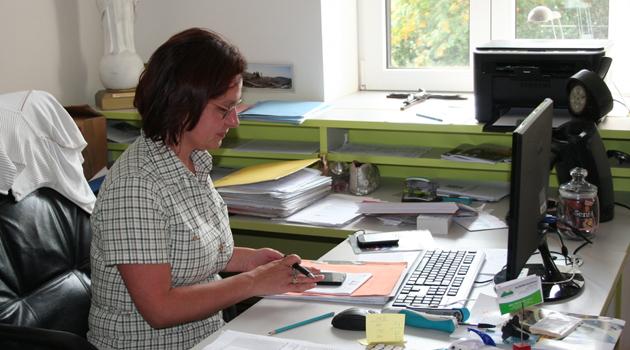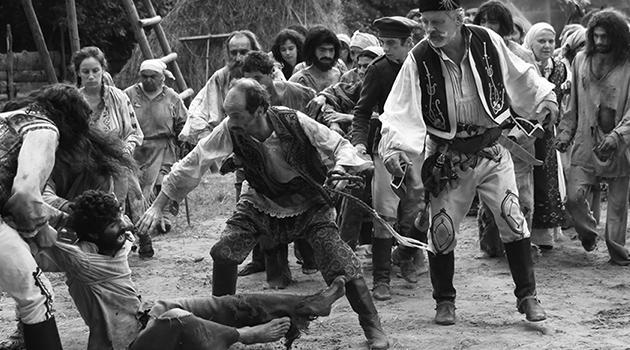Director of Czech NGO says Karlovy Vary Region suffers in terms of education

In the year 2001, Trappist monks chose to use the agricultural area of a former Baroque-era estate in the town of Nový Dvůr as a monastery and initiated the creation of a nonprofit organization called Český západ (Bohemian West) in the excluded localities of the Teplice and Toužim area. The headquarters of the NGO are located one kilometer away, in the town of Dobrá Voda, near a prefabricated apartment building inhabited predominantly by Romani community members.
Since April 2016 that organization has a new director, Petra Vodenková. News server Romea.cz has interviewed her about her plans and vision.
Q: What kinds of social services do you offer your clients?
A: We provide services to all of the Teplice and Toužim area. We offer services for families with children that an average of 35 families take advantage of, and we offer programs in the field focused on adults. That service is being taken advantage of by roughly 80 clients now. We also provide aid with one-time problems, which we assist the client with resolving and then he or she does not need our services any longer, unlike those who are trying to solve long-term problems.
Q: Who is your target group?
A: The target group is the inhabitants of the socially excluded localities. We have been working longest in the municipality of Dobrá Voda, where approximately 110 inhabitants have been permanently residing, of whom roughly 80 are of Romani nationality. They occupy a prefabricated apartment block near the headquarters of our organization and they are primarily indigenous residents who are living here as a community. However, if we look at the other socially excluded localities in our region, such as the one in Nová Farma, they are grappling with worse problems there because of expensive apartments that are not of very good quality. The occupants of those units change rather frequently and come from northern Bohemia, other parts of the Czech Republic, and Slovakia.
Q: Are all of your clients Romani?
A: Not all. We provide social services to anybody. It’s true that ethnic Romani people comprise a very big part of our clientele, but that does not mean that if a majority-society person needs aid we would refuse them.
Q: How many employees do you have and how many would you eventually need?
A: This region has one actually very painful aspect to it, and that has to do with people’s education. We have an enormous problem finding employees who have been educated as social workers. In the entire region there is just one private school that provides that kind of education. Unfortunately, if people have to move away for an education, most of them don’t return. As far as the employees themselves, the standard is that we need one employee per 10 nuclear family clients. However, we don’t approach it that way, because our services are used by larger families where it’s customary for one household to have six members. We can, therefore, just provide our services to the families for whom we have the capacity.
Q: Some of your employees also live in the prefabricated apartment building in Dobrá Voda, what do you see the benefit of that as being?
A: Those employees have had experience with community work in their own lives. They have experienced many situations themselves and they are able, because of their own experiences, to provide social services and aid others, which actually works.
Q: Is there any way in which it is a disadvantage?
A: It could have the opposite effect on some of the groups living there. For that reason, I would like to employ majority-society staffers for our local services to families with children and our programs in the field. We are doing our best to send our Romani staffers to the surrounding socially excluded localities, but an important task for the manager of the services is to appropriately choose which staffer will provide which service.
Q: You have been director just a brief time, what is your vision for the future?
A: I certainly would like to move Český západ forward, but I don’t want to undertake big changes because people might not like that. I would be glad if the competences of the social workers here could be increased and the quality of the services we provide under the law on social services could be improved. The region has created what it calls “Regional Cards”, which describe what a concrete service is supposed to provide, it’s basically a kind of guide, a handbook, and the staffers who are already working with it greatly praise it.
Q: What are the Regional Cards, basically?
A: It’s about basing an assessment on what people’s actual needs are, not what their stated wishes are. I’ll give you an example. Rather frequently a staffer has to contact a family because a child is not doing well in school or is even not attending school. When that staffer visits the family to find out what the problem is, thanks to this card, he or she can learn, for example that the problem might be in some other area – for example, in the family’s finances. The child might not be attending school because the family doesn’t have the money for the bus. The staffer can offer aid, for example, with the family’s economic management, or with setting up a payment schedule for those in debt. Thanks to the Regional Cards, the staffer accesses matters that at first glance appear not be necessary at all.
Q: The town of Toužim is not collaborating with the Czech Government Agency for Social Inclusion. What all are you, as a local organization, losing because of that?
A: We are losing the opportunity to apply for money for ad hoc activities that cannot be covered by the subsidies provided by the Regional Authority. Those kinds of activities, however, are necessary components of our projects, so we have to undertake them because we have pledged to do so. We must, therefore, find other grant calls and other ways to arrange to finance them. We do this by applying for smaller projects, and that involves even more of an administrative burden and liability. Bigger projects would represent, for us, greater certainty over more years and would contribute a bigger volume of money, that would resolve the situation.
Q: What would happen if Český západ stopped providing social services in the Teplice and Toužim area?
A: As far as social services provision goes, there would be a dearth locally. The area in which we work is not very big geographically, but this work is greatly necessary here. No other organization works here. Crime and unemployment would increase.
